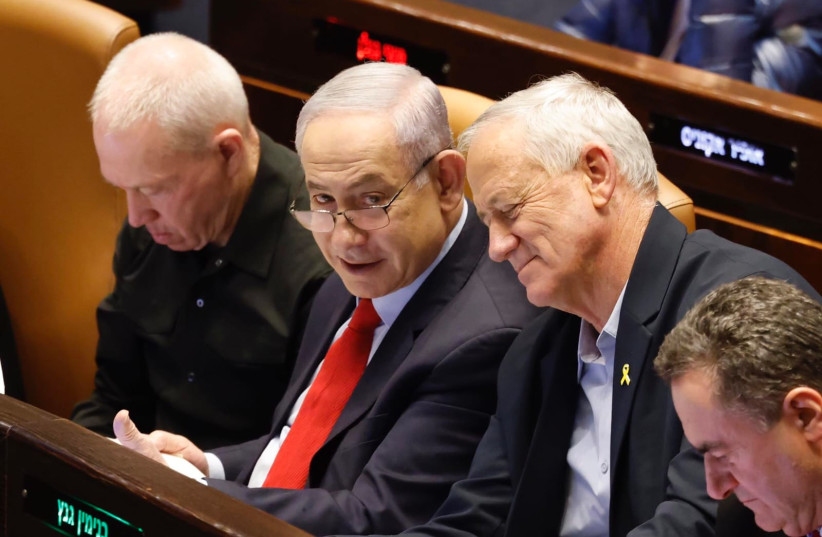Chuck Schumer: Don’t interfere in Israel’s politics
It hurts when your ally tries to interfere in your country’s politics, but it hurts even more when it comes from someone who is so close and supportive.
On Thursday, Senate Majority Leader Chuck Schumer called for an election in Israel to find a successor to Prime Minister Benjamin Netanyahu, marking the most direct opposition by an American official to Israel’s leader since October 7.
Schumer expressed this view on the Senate floor, cautioning that the US might need to intervene more directly to foster long-lasting peace, if the current situation persists. Schumer, the Jewish Democratic senator from New York said Netanyahu’s leadership was one of four principal barriers to peace. The other obstacles were: the actions of Hamas and its allies, extreme elements in Israel’s right-wing government, and Palestinian Authority President Mahmoud Abbas.
“If we fail to overcome them,” he warned, “Israel and the West Bank and Gaza will be trapped in the same violent state… they’ve experienced for the last 75 years.”
The US government should demand Israel conduct itself with a future two-state solution in mind, he said. “We should not be forced into a position of unequivocally supporting the actions of an Israeli government that includes bigots who reject a Palestinian state.”
Netanyahu vs. Schumer: Election interference

Joe Biden supported Schumer. “He made a good speech, and I think he expressed a serious concern shared not only by him, but by many Americans,” the US president said.
On Sunday, Netanyahu accused Schumer of opposing the Israeli public by calling for new elections, as reported by The Jerusalem Post’s Tovah Lazaroff. “It’s inappropriate to go to a sister democracy and try to replace the elected leadership there,” Netanyahu told CNN’s Dana Bash. Israel “is not a banana republic,” and its people choose.
Schumer has an impressive pro-Israel record that cannot be ignored. In 1994, he campaigned with the Anti-Defamation League and the American Jewish Congress to revoke the tax-exempt status of the Holy Land Foundation, a Palestinian-American charity and the country’s largest Muslim charity until its closure in 2001.
In 2010, Schumer’s comments at an Orthodox Union event, advocating for the economic strangulation of Gaza to discourage support for Hamas while emphasizing the importance of humanitarian aid, drew criticism. He credited economic prosperity in the West Bank to cooperation with Israel and justified Israel’s blockade of Gaza as a means to promote moderation.
Schumer consistently supported Israel, notably during the 2014 Israel–Gaza conflict – and in 2018, he dismissed the connection between Israeli settlements in the West Bank and the overall conflict. He also co-sponsored a Senate resolution opposing UN Security Council Resolution 2334, which condemned settlement-building, criticizing the Obama administration for its abstention.
In 2017, he co-sponsored the Israel Anti-Boycott Act, proposing penalties for participating in boycotts against Israel and settlements in response to Israeli government actions. He also introduced a resolution celebrating the 50th anniversary of Jerusalem’s reunification and praised then-President Donald Trump in 2018 for moving the embassy to Jerusalem – which he supported for decades.
In the complex realm of international relations, the urge to advocate for democracy and peace is noble, but the path to such ideals must be taken carefully, respecting the sovereignty and will of each nation’s people.
Schumer’s intentions, rooted in a long history of support for Israel, reflect a genuine desire for peace and stability in the region, but intervening in the political process of another democracy, especially an ally like Israel, raises significant concerns about respect for self-determination and the potential for unintended consequences.
The delicate balance between supporting allies and respecting their autonomy requires nuanced understanding and restraint.
While external voices can play a role in encouraging dialogue and peace, the decision-making power ultimately lies with the citizens in question.
As history has often shown, external interventions in another country’s politics can complicate and sometimes exacerbate tensions, however well-intentioned.
Most Israelis reject a two-state solution, so promoting one must honor the principles of sovereignty and self-determination. Let’s encourage dialogue, support and cooperation, but also remember the importance of allowing nations to chart their own course democratically.





Comments are closed.